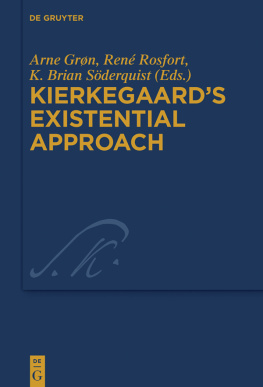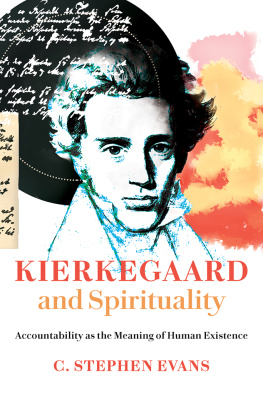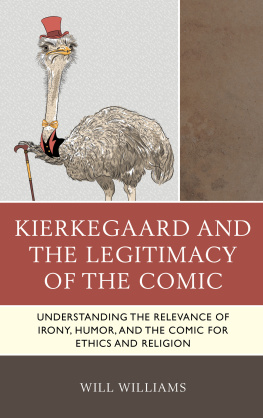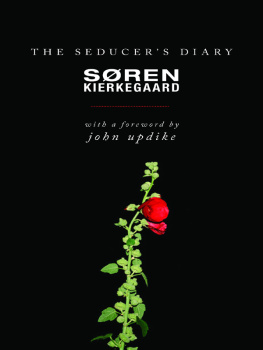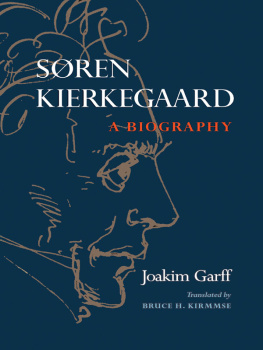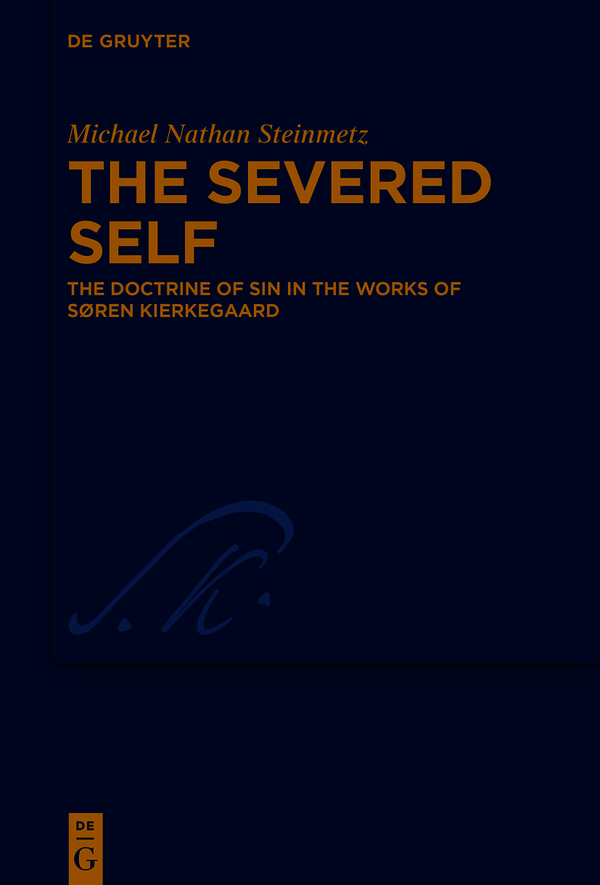Kierkegaard Studies. Monograph Series
Edited by
Heiko Schulz
the Sren Kierkegaard Research Centre
Peter ajda
Jon Stewart
Karl Verstrynge
Volume
ISBN 9783110753394
e-ISBN (PDF) 9783110753448
e-ISBN (EPUB) 9783110753486
Bibliographic information published by the Deutsche Nationalbibliothek
The Deutsche Nationalbibliothek lists this publication in the Deutsche Nationalbibliografie; detailed bibliographic data are available on the Internet at http://dnb.dnb.de.
2021 Walter de Gruyter GmbH, Berlin/Boston
Chapter 1 Introduction
What has been is what will be, and what has been done is what will be done, and there is nothing new under the sun. Is there a thing of which it is said, See, this is new? It has been already in the ages before us, and new situations call for novel explanations.
The doctrine of sin is an unpleasant topic, and many investigations of sin miss the mark of sins profundity and ubiquity. The good news of the Gospel implies bad news regarding humanitys condition. One key issue facing theologians is addressing adequately the reality of sin. As Cornelius Plantinga opines, How must the doctrine of sin be taught in settings where pride is no longer viewed with alarmwhere, in fact, it is sometimes praised and cultivated? The modern world may have a warped concept of sin, but theologians must respond to a world in desperate need of salvation.
Danish philosopher and theologian Sren Kierkegaard, too, was immersed in a culture that lacked a deeper understanding of authentic Christianity. He lamented that his culture was under the enormous illusion [of] Christendomthe illusion that in such a country all are Christians of sorts. Kierkegaard astutely comments on his epoch in one of his discourses:
It is supposed to be a sign of a sophisticated age that the inadmissible, the forbidden, and sin are given an absolving, an almost honorable name. Sometimes the falsification is continued so long that the old, earnest, and explicit word is forgotten and goes out of use. If it happens to be heard on occasion, it almost evokes laughter, because it is assumed that the speaker either is a man from the country who speaks an archaic, stilted languageor is a wag who is using such a word simply to evoke laughter.
Furthermore, the philosophy of Kierkegaards Copenhagen viewed sin objectivelya thing to be studiedrather than subjectivelya truly horrifying existential reality. Kierkegaards method leaves his contemporary readers in a conundrum: How do we navigate the tumultuous waters of his writings?
Sren Kierkegaard is an untapped resource for theologians, and the concept of sin permeates his writing. The problem is that Kierkegaard does not present his views in a systematic fashion. In this work I look at the entirety of Sren Kierkegaards writing in order to systematize his doctrine of sin. Upon categorizing his doctrine of sin, I examine all his writings to see whether Kierkegaard is consistent in his hamartiology across his numerous pseudonyms. Lastly, I put Kierkegaard in conversation with the broader theological discussion, giving Kierkegaards answer to common hamartiological questions which theologians pose.
Before we can dive into Kierkegaards works to synthesize his hamartiology, we must address certain issues of Kierkegaards context and overall writing style. First, I present a brief biography pertinent to our investigation. Second, we cannot read Kierkegaard faithfully without knowing one of his primary foils, so I briefly examine the thought of George Wilhelm Friedrich Hegel as it relates to Kierkegaards work. Third, we must make sense of Kierkegaards often meandering style, purpose, and method of writing. I present Kierkegaards own views on his authorship, followed by a survey of his theory of the stages of lifes existence. Lastly, I sketch our path forward. Once addressing such prolegomena, we can tackle the issue of Kierkegaards doctrine of sin.
A Fragment of Biography
Sren Aabye Kierkegaard was born May 5, 1813 in Copenhagen, Denmark, the youngest of seven children. The Kierkegaard household was an apparent contradiction. Kierkegaards father, Michael Kierkegaard, was a well-off merchant who worked his way up from serfdom to become a prominent shipper and trader in Copenhagen, even having special permission from the king to trade with imports from the East and West Indies. Space does not allow for a detailed biography, but two seminal events in Kierkegaards life inform our inquiry into his writings concerning the doctrine of sin: Kierkegaards relationship with his father Michael and Kierkegaards relationship with Regine Olsen.
While the death of family members is tragic enough, Michael harbored two sordid secrets that greatly affected Sren. At some point in their relationship, Michael confessed these two secrets to Sren. First, Srens mother, Ane, was actually Michaels first wifes maid. Ane became pregnant mere months after the death of Michaels first wife, and Michael begrudgingly married her. Second, Michael confessed that as a poor serf in the Danish countryside, he cursed God for his hard life. Sren mentions this information in his journals: How dreadful the thought of that man who once, as a small boy tending sheep on the Jutland heath, in much suffering, starving and exhausted, stood up on a hill and cursed Godand that man was unable to forget it when he was 82 years old. Michael carried his unconfessed sins throughout his life, and such scandalous revelations from a seemingly pious man shocked Sren. In Srens journals, he describes this time as an earthquake:
Then it was that the great earthquake occurred, the frightful upheaval which suddenly drove me to a new infallible principle for interpreting all the phenomena. Then I surmised that my fathers old-age was not a divine blessing, but rather a curse, that our familys exceptional intellectual capacities were only for mutually harrowing one another; then I felt the stillness of death deepen around me, when I saw my father an unhappy man who would survive us all, a memorial cross on the grave of all his personal hopes. A guilt must rest upon the entire family, a punishment of God must be upon it: it was supposed to disappear, obliterated by the mighty hand of God.
Scholars disagree on which of the two secrets caused the earthquake, but the shameful past of his father haunted him throughout his authorship.
The second event that affects our investigation is Srens broken engagement to Regine Olsen. Kierkegaard met Regine in 1837, and on September 10, 1840, he proposed to her. Kierkegaard recounts that the next day I saw that I had made a mistake. One can clearly derive from Kierkegaards writings and journals that the reason for their split was twofold.
First, Regine was partially right: Kierkegaard feared his melancholy would bring Regine down into the abyss of despair with him. Kierkegaard writes in his journals, Then I would have married her. Let us assume that. What then? In the course of half a year or less she would have torn herself to shreds. There is something spectral about meand that is both the good and the bad in mesomething that makes it impossible for anyone to endure having to see me every day and thus have a real relationship with me. Kierkegaard had bouts of depression and melancholy, like his father Michael, and he did not believe he was just to submit Regine to his brooding.
Second, Kierkegaard did not think Regine was yet in the religious state of existence: She has no clue about the specifically religious.
Ultimately, Kierkegaard held out hope that they could reunite. Before Regine was married to Johan Schlegel, Kierkegaard wrote, Had I faith I would have stayed with Regine. Praise and thanks be to God, I have now understood it. I have been on the point of losing my mind these days.So she should, if possible, become my wife. Kierkegaard ended this journal entry with a heartbreaking admission:


